
Journalism is the art of translating abysmal ignorance into execrable prose. At least, that is its purest and most minimal essence. There are, of course, practitioners of the trade who possess talents of a higher order—the rare ability, say, to produce complex sentences and coherent paragraphs—and they tend to occupy the more elevated caste of “intellectual journalists.” These, however, are rather like “whores with hearts of gold”: more misty figments of tender fantasy than concrete objects of empirical experience. Most journalism of ideas is little more than a form of empty garrulousness, incessant gossip about half-heard rumors and half-formed opinions, an intense specialization in diffuse generalizations. It is something we all do at social gatherings—creating ephemeral connections with strangers by chattering vacuously about things of which we know nothing—miraculously transformed into a vocation.
So begins philosopher David Bentley Hart’s ripping of journalist Adam Gopnik’s musings on theism. He makes it clear that his comments are “no particular reflection on Gopnik’s intelligence—he is bright enough, surely—but only on that atmosphere of complacent ignorance that seems to be the native element of so many of today’s cultured unbelievers…Not only do convinced secularists no longer understand what the issue is; they are incapable of even suspecting that they do not understand, or of caring whether they do…[T]here is now—where questions of the divine, the supernatural, or the religious are concerned—only a kind of habitual intellectual listlessness. ” Because to this, critics like Gopnik never grasp the metaphysics of “pure “classical theism,” as found in the Cappadocians, Augustine, Denys, Thomas Aquinas, Ibn Sina, Mulla Sadra, Ibn Arabi, Shankara, Ramanuja, Philo, Moses Maimonides . . . well, basically, just about every significant theistic philosopher in human history. (Not to get too recherché here, but one can find most of it in the Roman Catholic catechism.)”[ref]Speaking as a Mormon, I know many of my fellow Latter-day Saints would do well to learn and understand the classical theism of other Christian denominations.[/ref] Instead, they claim a certain kind of materialism as having “exclusive ownership of scientific knowledge” and “assert rights here denied to Galileo, Kepler, and Newton[.] Or to Arthur Eddington, Werner Heisenberg, Max Planck, Erwin Schrödinger, Paul Dirac, Anthony Zee, John Barrow, Freeman Dyson, Owen Gingerich, John Polkinghorne, Paul Davies, Stephen Barr, Francis Collins, Simon Conway Morris, and (yes) Albert Einstein[.]”
Hart’s concluding words have much to teach not only unbelievers, but believers as well:
The current vogue in atheism is probably reducible to three rather sordidly ordinary realities: the mechanistic metaphysics inherited from the seventeenth century, the banal voluntarism that is the inevitable concomitant of late capitalist consumerism, and the quiet fascism of Western cultural supremacism (that is, the assumption that all cultures that do not consent to the late modern Western vision of reality are merely retrograde, unenlightened, and in need of intellectual correction and many more Blu-ray players)…Principled unbelief was once a philosophical passion and moral adventure, with which it was worthwhile to contend. Now, perhaps, it is only so much bad intellectual journalism, which is to say, gossip, fashion, theatrics, trifling prejudice. Perhaps this really is the way the argument ends—not with a bang but a whimper.
Unfortunately, I think this captures the culture of believers and non-believers alike. This is why Terryl and Fiona Givens find that “militant atheism” and “fervent theism” are “both just as likely to serve as a dogmatic point of departure, as they are to be a thoughtful and considered end point in one’s journey toward understanding…[N]either the new believer nor the new doubter has necessarily progressed or reached enlightenment.”[ref]Terryl & Fiona Givens, The God Who Weeps: How Mormonism Makes Sense of Life (Salt Lake City: Ensign Peak, 2012), Kindle edition. “His Heart Is Set Upon Us.”[/ref] Both theists and atheists should reengage in this “philosophical passion and moral adventure” for the bettering of each other.
“Journalism is the art of translating abysmal ignorance into execrable prose. At least, that is its purest and most minimal essence. ”
Haha, so true.
“Feather-footed through the plashy fen passes the questing vole…”